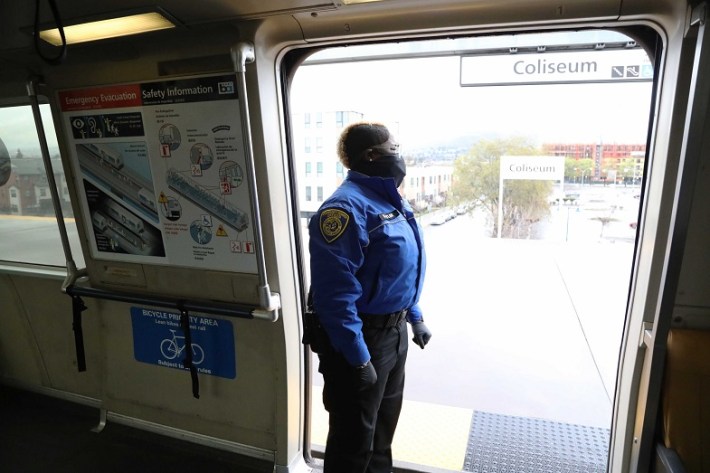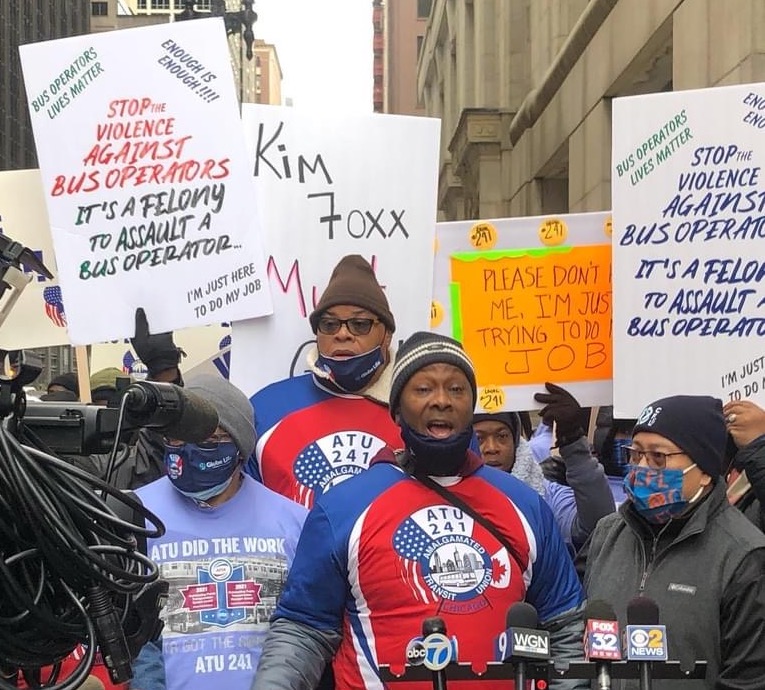During the pandemic, a time when many Chicagoans are experiencing economic and mental health crises, there has been a spike in violent crime on the CTA, including increasingly frequent assaults on public transportation workers. That's led to demands that more be done to protect passengers and employees. Earlier this month during a rally organized by the transit unions, dozens of bus drivers marched from City Hall to Millennium Park, holding up traffic for about 20 minutes at Washington Street and Michigan Avenue, where a bus driver was recently beaten in a random attack.
Many potential solutions have been discussed by union leaders and transit officials, including stiffer penalties for people who assault public transportation workers, the ability to ban offenders from CTA property, and an in-house CTA police force, similar to Metra police. However, adding more armed personnel to the system creates more potential for the enforcement of minor infractions to escalate to bloodshed.
One best practice that hasn’t been publicly talked about by local leaders until recently is unarmed Transit Ambassadors. On peer systems like the San Francisco Bay Area’s BART system, these outreach workers have proven to be an effective way to deter crime and promote compliance with important rules, such as mask mandates and smoking bans. These workers receive de-escalation and anti-bias training before deployment, and only about 1.1 percent of the BART ambassadors' interactions with the public have involved the ambassadors calling for police backup.
Earlier this week Streets finally got the CTA on the record about this strategy. "While the CTA is not currently planning a Transit Ambassador program, we continue to monitor other programs at the handful of U.S. transit agencies that have them to learn from their experiences,” the agency said in a statement.
We've also reached out to the local union leaders about the Transit Ambassadors idea. Today we heard back from Keith Hill, president of the Amalgamated Transit Union Local 241, which represents bus drivers. Hill was unfamiliar with the BART program, which isn't surprising since the BART ambassadors patrol trains, not buses. But when I explained how it works, he responded, "Oh yeah, I'd definitely support that."

"We just want to be able to do our job safely and go from Point A to Point B with no problems. Whether it's armed or unarmed, we don't care. We just want to be safe."
Hill said that, in a similar vein, from the mid-1990s to the mid-2000s the CTA had a training program for bus operators that taught them deescalation techniques, which he said was valuable. "It taught you how to recognize situations and prevent them from going badly." He said he's not sure why that initiative was discontinued.
The union president attributed the recent wave of violence towards CTA workers to "frustration, mental illness, and overall disregard for respecting others," adding that "the pandemic plays a major role in that."
He noted that local security firms have offered to provide armed guards to stand at bus stops along routes that have seen problems with violence and regularly check in with bus driver, although the guards wouldn't be allowed to enter the buses with their firearms. (Streetsblog Chicago does not endorse adding more armed guards or police to the system.) "That would be a great start, but that's a Band-Aid solution to a system-wide problem."
"To be honest we need our own police detail to focus on issues on the CTA," Hill said. "We don't have an opinion about whether they're armed or unarmed," Hill added. "We just want a crime deterrent."
Hill concluded by saying that violence against CTA bus drivers "is a serious issue, and we're no longer going to stand by and allow ourselves to be attacked in that seat. We have to have some serious conversations, and we need some serious solutions."






